#ecological horticulture
Text
youtube
Extremely accessible video for any family members you may be trying to help steer away from large lawn.
16 notes
·
View notes
Text
A list of (realistic) things you can do to be more environmentally friendly
(from an earth-loving horticulture student.)
— COSMETICS
Use bar soap instead of soap bottles
Use old toothbrushes for cleaning surfaces
Try exploring and researching some homemade face/body/lip products
Use ice sleeves, sunglasses, and caps instead of sunscreen (Edit: I’ve seen people say that it is safer and even necessary to wear sunscreen at all times so try to use eco friendly sunscreen instead! In my country it’s pretty uncommon to wear sunscreen often as we usually wear ice sleeves which is why I did not know this oof)
Use coffee grinds or homemade tumeric masks instead of cosmetic products with exfoliator beads
Invest in a metal ear cleanser instead of cotton buds
Try placing more importance on skincare instead of contributing to exploitative beauty companies by buying makeup
Use cosmetic products that do not contain palm oil
— CLOTHING
Try as much as possible to rewear your outfits at least twice before washing them
Actually WEAR your clothes! I know some of y’all just wear them once for your Instagram post and let it rot in your closet forever. Stop doing that!
Thrift, stitch up holes in your clothes, and use second hand clothing instead of supporting fast fashion companies like SHEIN, H&M, Zara, etc.
Cut up your old clothing into yarn and do macramè with it
Cut patches of old clothing to turn into reusable cotton pads
Learn how to knit, crochet or stitch your clothes!
If you use tampons, try menstrual cups or discs instead. If you use pads, try reusable pads or period underwear. (Trust me, it works). Also, use reusable panty liners instead of disposable ones. They may seem expensive but you will end up saving a lot more in the long run
— GARDENING
Plant seeds/cuttings in your old bottles, jars, and containers
Propagate your plants and exchange cuttings with your friends instead of buying new plants
Make your own soil mixes instead of buying soil mixes
Better yet, don’t use soil for your indoor plants and try getting into hydroponics or semihydroponics instead. This saves so much water and doesn’t contribute to mining of soil
Fertilise plants with fruit peels, coffee grinds, and tea leaves. (DO NOT use chemical fertiliser on soil)
Plant more legume plants in your garden instead of using nitrogen fertilisers. (Look up the nitrogen cycle if you need an explanation on this)
Avoid pesticides unless really needed. Try sprinkling cinnamon powder on soil or spraying neem oil on plants and soil to keep away pests.
If you have a lawn, try looking into rain gardens and consider making one
Let the (non invasive) weeds in your lawn/garden grow! They are there for a reason!
Stop killing earthworms and millipedes in your garden. This also applies to snails native to your region. They are there for a reason.
Water used to wash fruits and rice can be used to water plants
— REDUCE, REUSE
Use the caps of jars as soap holders
Use recycled paper/notebooks
Wash and dry your glass/plastic items before throwing them in the recycling bin
Keep any plastic bags for future use
Use eco friendly or reusable dish sponges
Use reusable straws and cups
Invest in a fabric cup holder
Bring a water bottle with you wherever you go
Drink more water and less sugary drinks
Bring reusable bags for buying groceries instead of using plastic ones
Always keep a folded up tote/shopping bag with you in case you spontaneously decide to buy something
— ELECTRICITY
Set a timer on your air conditioning instead of letting it run throughout the night
Better yet, use a fan instead of an air conditioner
Open your windows! Aerate your home!
Allow natural light to enter your home during the daytime, so as to avoid turning on your lights
Switch to LED lightbulbs instead of regular lightbulbs
Turn off any switches in your house when they are not in use
Collect the water from your air conditioner/dehumidifier condenser and use that to water plants, clean surfaces, steam ironing, and flushing toilets. Do not drink it though!
— INTERNET
Delete your all of your unwanted emails
Delete your inactive social media accounts
Try not to post excessively on social media and stop scrolling excessively too. This not only reduces energy usage but also improves your mental health and productivity
Try to keep to one social media app instead of having so many
Reduce your internet usage
Save your eBooks on a thumbdrive instead of on cloud
Use Ecosia instead of Google
Stop being influenced by social media trends that only just contribute to consumerism
Download music instead of streaming
Reduce online shopping
— FOOD
Reduce intake of processed foods
Reduce intake of fish, beef, and dairy
Try eating vegan or vegetarian foods at least once or twice a week
Cook your own meals instead of eating out
Bring your own food containers when taking away food from stores
Beeswax wrap instead of cling wrap!
Buy loose-leaf tea or plastic free tea bags instead of regular tea bags
Eat more mushrooms, vegetables, and fruits and drink more water
Support local farmers
And finally, educate yourself more about ecology and the environment!
#environment#ecology#sustainability#ecofriendly#anti lawn#anti beauty culture#hell on earth#save the earth#recycling#fast fashion#plants#feminism#environmental activism#plantcore#ecopunk#solarpunk#horticulture#sustainable#slow fashion#zero waste#plastic free#conservation#climate change#global warming#soil science
1K notes
·
View notes
Text
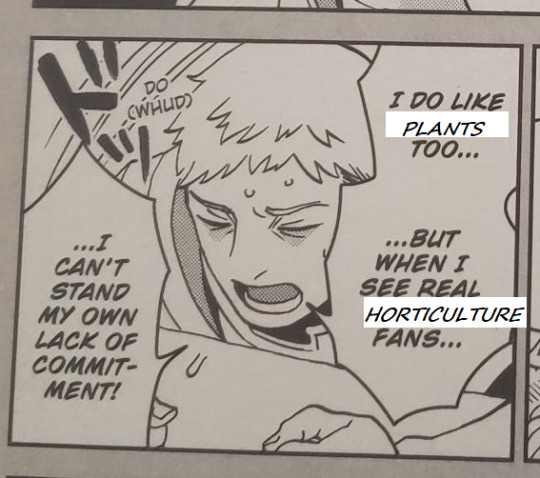
#plants#horticulture#botany#landscape architecture#me in all of my landscape/botany-related classes#I do like ornamentals (I really do) but they're not special interest grabby like other things#I go to friends for plant IDs and latin names#they come to me for orchard design and ecological considerations#nd#dungeon meshi
315 notes
·
View notes
Text
GOT APPROVED FOR GRADUATION W MY HORTICULTURAL SCIENCE CERTIFICATION TODAYYYYYY LETS GO LADS 1/4 DEGREES DOWN
43 notes
·
View notes
Text

Recently, a copy of Alpines & Bog Plants by Reginald Farrer fell into my hands (thank you, antiquarian bookseller). At first I thought it would be botany but it is actually a mix of hobbyist naturalist & horticultural anecdotes.
It’s a first edition, published in 1908 -- remarkably well kept, pretty obvious spotting & foxing and one plate appears to be detaching from the spine. The book is remarkably poetic, but it would be free verse with binomial nomenclature, which I haven’t seen before,

The dedication is an excerpt from Hippolytus by Eurypides, roughly (according to my friend who studies classics):
“For you, lady, I bring this plaited garland I have made, gathered from an inviolate meadow,
a place where the shepherd does not dare to pasture his flocks (except rabbits), where the iron scythe has never come;”
In Hippolytus this is spoken to Artemis, but in this case the dedication is to Farrier’s mother which is heartwarming :)
Here I will note that the idea of “nature” as something undisturbed (ungrazed, unharvested) is central to the colonial conceptualisation of ecology and has contributed to the forceful removal of indigenous peoples from their land (and the subsequent loss of biodiversity, as humans are not separate from nature and we can play an important role in ecosystems)
Not calling Eurypides or this book inherently bad/colonial (more on the book & colonialism later) but this idea is def present in modern ecology and colonialism and important to highlight when present.
The book is full of black&white photographic plates which have held up really well for being over a century old. The plates themselves are beautiful:

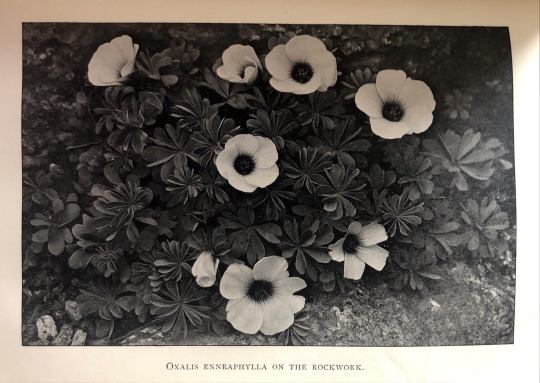

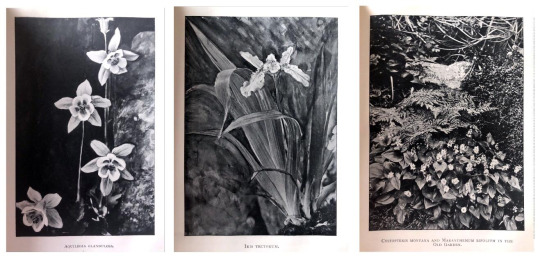
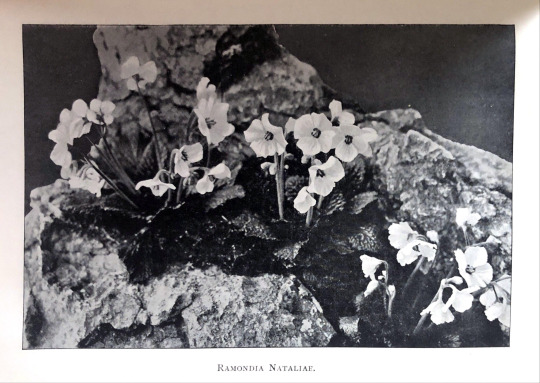

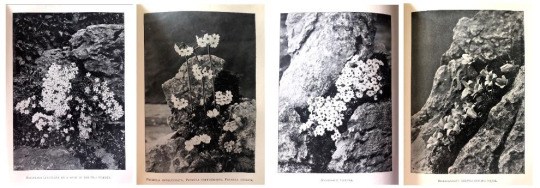
The photographs were taken in Farrer’s own garden. Little snapshots of the past :)!!
The text content of the book is quite intriguing and not all good, definitely carries heavy cultural baggage as does modern Western biology in general. I will preface this by saying I have absolutely not battled my way through this book, but I have read sections. there is a definite 1900s-Englishman tone in all the ways that can mean. part of that is most certainly a degree of both xenophobia and orientalism. When venerating the beauty of the wilderness and of Japanese/Chinese garden design, there is obvious othering in the language used & Farrer is dismayed at the effects of cultural transmission (this is most notably in European gardens attempting to mimic the artistic style of east Asian gardens but using the “wrong” plants, usually European plants rather than importing non-native varieties that are more “authentic”). Farrer was deeply in love with Asian biota and was notable for collecting plants to bring back to Europe, and while I cannot speak on Farrer’s techniques specifically, such practices are deeply intwined in racism and colonialism. In many cases, economic systems & resulting hardships forced on other cultures by Europeans allowed them to exert control over certain groups, stripping them of agency and employing them to extirpate “uncooperative” groups. I haven’t found anything re:Farrer in this context but it is essential to place the entire book within this context!!
However the majority of the book is Farrer describing gardening as well as his travels to collect plants for propagation in the UK (notably he died while on one such plant-collection travel). Apparently (& corroborated by the preface) the plants he searched for were ones that would grow well in the UK w/o much care, to make having a cool garden more accessible regardless of income. so if a plant needed extensive care and things like hothouses, it was not his priority.

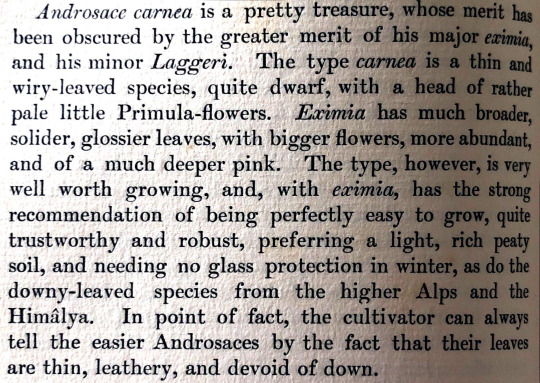
The way he describes plants is vaguely anthropomorphised in a generally appealing way, trying to make the reader appreciate the plant for things such as hardiness and robustness, which I suppose would align w/ the idea of making gardening easier. also in the sense that the robustness is tied in with beauty as well, as these features are of course not opposed to one another.
I may snoop through this book further to see anything else , we will see.
#library#antique books#antiquarian books#natural history#antique photography#history#books#old books#botany#gardening#horticulture#ecology#dark academia#miaow#osedax bookblog
65 notes
·
View notes
Text
@deckdancer and I were conversing this evening, and he had this question about mass farming practices. My response ended up being a little lengthier than I anticipated, but I was also trying to be concise (which is hard for John the Verbose, lol)
I've been having a lot of thoughts about plants and mass farming practices tonight, and while I know horticulture isn't exactly your specialty, I wanted to hear your thoughts on the disconnect between the symbiosis of nature vs the mass farming practices we use today, and their effects on us today as a society?
One thing I've noticed over the last 10 years is how stressed the corn fields look when we've had year after year of drought conditions. The leaves curl along the edges and look like dessicated spears. Corn is a huge water hog, and an inefficient hog at that. Most of the water is ultimately lost to evapotranspiration meaning the water table doesn't even recharge at all from irrigation.
So much of that corn goes to ethanol plants and livestock feed, so it still has a high demand, but many of the crops just die or are stunted before they can be used. Before irrigation technology was widespread, places like Minnesota grew more wheat. Minneapolis was (and still is) where so many big flour mills are, but now the wheat grain comes in from the high plains. Wheat is what we should be growing for our climate already, but corn became popular because of irrigation. Wheat uses much less water, and some cultivars can be harvested twice a year.
Factory farming of corn has changed noticeably in my own lifetime. I remember the rows used to be a bit farther apart. You could run between the rows and pretend to be the "children of the corn." My dad said he could remember when he was younger there were much wider gaps in the rows of cornfields. We've bred them for higher yield and to be planted closer together that both of those factors mean they need much more water than they used to. Some farmers plant rows so close together you almost can't walk between them now.
A lack of diversification is also a problem as well. The past three years have been really bad for corn, but for many farmers, it's their cash crop. Soy beans have become a novelty... alfalfa a rarity... and I'm shocked if I ever see any wheat at all. Monoculture crops (even beyond grains) are begging for any one-off minor catastrophe to jeopardize the whole crop. If a plant disease or infestation pops up, it will spread much faster than if we had varied crops, and of course it would have a more detrimental effect if that one monoculture crop gets destroyed. Palm oil farming is another example of a fragile monoculture.
Diversification is easier said than done though. You can't use a single type of harvester machine for all crop types. The Cherokee would plant things together: Corn, pumpkins/squash, and vine beans. They understood for generations that those "Three Sisters" thrived better together than by themselves. The beanstalks would climb the corn, the beans would put nitrogen and nutrients back in the soil, and the squash/pumpkins would reduce evaporation from the soil. The large gourd leaves would reduce the amount of sunlight on the ground, inhibiting weed growth. All that today would still require harvesting by hand, and unfortunately it is considered too unprofitable. It would be suitable for people with gardens, self-sufficient homesteads, or small-scale farms (and we gotta WANT to get into that, too).
The big problem is (I think) that first we would need a large-scale, multifaceted cultural shift. Ethanol as biofuel is not as sustainable as the industry wants us to believe. As much as I love beef, we gotta reduce our consumption of large livestock. Cattle need a lot of corn and a lot of water. Other farm animals are more efficient in terms of resources required per pound of meat. That's a statement that sounds great for reducing corn and water usage, but other monoculture crops have their own unique pros and cons.
13 notes
·
View notes
Text
🌱General Information 🌱
🌸———————————————🌸
Basic Introduction🌿
Heya I'm Markus, I also go by Moss. I'm huge plant nerd and violently obsessed with collective wildflower feildguides. I am by no meana a professional horticulturist or botanist (though I desperately want to be), Studying plants and growing them however is a major passion of mine!
I'm hoping that by posting on this blog, I can motivate myself to learn even more about plants and actually jot down some information for other people. I belive we all need to become way more aware of the hugely important role that flora play in out world and what plants are actually helpful and which ones are damaging (I'm looking at you invasive plants/monoculture forest/ect.)
Oh, also, the last thing to know about me is I desperately hope all oil, gas, and car company CEOs fricken 💥💥💥 Ahhhh cough on smoke.... yeah.....
What this blog is about☘️
I plan to mostly use this blog to help share gardening tips, information on native plants, general ecology posts, horticulture/Agricultural/permaculture all the plant growing cultures and stuff, sustainability, and conservation Just generally, anything to do with plants and our precious earth's ecosystem, I suppose. However, as I live on the West Coast of B.C I want to focus a lot on my local native flora and ecosystem!
That's probably going to be a big point of the blog so if you too are a B.C West Coast Flora Fanatic rejoice!!
More Information under the Break🌱
Scheduling plan (That I will hopefully follow)🌧
Floriography Friday🌸Fridays
The history of flowers and their meanings are always a little bit tricky and varied depending on place to place. That's the beauty of it, though that one flower can mean a thousand different things depending on where you are, the color, what other flowers accompany it, even where it worn! Plants have always been important symbols in our art and culture.
————————————
(Possibly) Your homes Native Plants Apprication Day🌿Thursdays
Send in submissions of a plant native to where you live that you think needs some more love or that you just really this is neat! Of course if there are no submission a random place will be picked for Native Flora Apprication Thursday!
————————————
West Coast Native Flora Wednesday🌱Wednesday
Cause we can all appreciate our native flora a little bit more, and maybe next time you're out you may even spot one yourself! Every Wednesday there will be a post detailing a random native plant of our wonderful West Coast <33
————————————
Gardening Tuesday🍅 Tuesday
Whether you're growing tomatoes or tulips, everyone can sometimes use some advice on what to do with their garden plants. From companion plants to what's the best P.H. for your crops, Tuesday is the day to look out for! On this day, there will mostly be some gardening tips posted, and also, alongside submissions, I will be open to send in any exciting gardening news or updates you've may have. Send in pictures of your biggest strawberries or your seedlings you've been waiting weeks to pop up. It's all welcome here :).
———————————
Alongside these, there should be regular updates on what seeds to sow at any given time, frost dates, conservation/sustainability projects you can support, community garden information and updates, and of course random sciencey plant facts and shitposts <33
—————————————————————————
Oh yeah also fuck of if your any of the below💥
-Bigot ( Racist/Sexist/Homophobic/Transphobic/Ableist/Zionist, General asshole) , Captalist suck up, Cop kiss ass, Mega Corpration lover, Government Stan.
Please do intract though if any of the below apply to you☘️
- Love nature, have a garden, have a passion for flora, belive in hope for future, hate big companies/governements for ruining our planet, love native plants, support your local communities , love hopepunk. are a bee, have a xylem and a phloem <33
Tags Masterlist
[To Be filled in Later]
#plants#native plants#botany#Gardening#horticulture#ecopunk#floriography#vancouver#ecology#ecosystem#Thats all the tags i can think of for now#Sorry to the people who regular these tags that have to see my big ass intro post
5 notes
·
View notes
Text
Yesterday I recorded a new episode of the fascinating Plants Grow Here podcast with Daniel Fuller, this time focusing on plant communication. That's right, plants DO communicate with each other and with other organisms! While Daniel is working on editing the recording for his podcast, I invite you to listen to the previous show I did with Daniel last year on plants' defences.
#katia plant scientist#botany#plant biology#plants#plant science#katia hougaard#plant scientist#botanist#australia#plants grow here#horticulture#gardening#plants and people#plant#plant aesthetic#plantblr#plantcore#plantas#ecology#plant facts#biology#evolutionary biology#talk show#science communication#podcast#public speaking#speaking#interview#conversation#Spotify
3 notes
·
View notes
Text
I don't understand why Metaldehyde is used to control Snail and Slugs in Agricultural, Horticultural and Landscaping settings when Salt Exists, like think of it this way, instead of placing chemicals into Soil where your Food Grows and could easily be swept away by the Elements like Chemical Runoffs from Rainfall.
Why not just invest in Nanotech "Predators" that enter our Soil and when it detects an incoming Slug or Snail it sprays them with Salt, heck make the Tech remote controlled or be played like something out of a video Game where you control the "Predator" via a phone and shoot Salt Bullets at slugs and Snails, you can make the "Predator" JUMP on the plant without hurting it.
We already have that technology, why is everyone withholding this idea? Don't give me the excuse that it's Expensive cause I know it's expensive but why is no one thinking about this?
#agriculture#horticulture#landscaping#nanotechnology#nanotech#anti lawn#technology#also don't give me the whole its cruel and inhumane when we use chemicals anyway#gardening#ecology#also you might be wondering if you missed the snail by some chance#and then there are Salt grains all over and its nanotech so you could just press auto and it will pick the salt grains that you shot#so it won't affect the Plant growth and soil nutrients
5 notes
·
View notes
Video
youtube
If you’ve met me in person or have followed me on instagram, you’ll know how I feel about lawns, the usage of fungicide sprays instead of systemics, how I think smokey the bear is one of the biggest perpetuated lies/ propaganda machines in forestry history, how I feel about the honey bees in the United States and the misrepresentation of the “save the bees” campaign has increased problems, and how vermiculture and the idea of using surface earthworms in compost has caused reprehensible and some of the most detrimental issues to our ecosystems as a hole. Areas where the phenology of egg laying worms conflicts with fire ecology and burn zones that are highly compartmentalized or continuous burn zones despite either human (first nations) land management or natural or areas where we have glacial fronting history had deep earth worms but never had frequent upper surface earth worms. We are so deeply effected them from the destruction of bacterial and mycological communities that decline in forests. Upper surface earth worms in the US are also what aids establishment of invasives and can even increase foreign allelopathic desertification faster. If you know about ground dwelling bees, or overwintering insects, you should be concerned. If you know about salamanders and foodweb interactions for birds and reptiles as well as small rodents, you should be concerned. From the composting and fishing communities continued usage this decline will only increase. If you live in the subtropical south flat lands post burn we have worms that can thrive because their phenology for surface appearance never is disrupted by burn season, instead it’s beneficial. These earthworms (deep soil) resolve themselves to earth until it’s time to lay eggs.
https://www.dnr.state.mn.us/invasives/terrestrialanimals/earthworms/index.html
https://ecosystemsontheedge.org/earthworm-invaders/
#surface earthworms are invasive in much of the united states#invasive species#vermiculture#compost#ecology#composting#permaculture#permiculture#botany#horticulture#cottage#cottagecore
18 notes
·
View notes
Text
hi all, we've been pretty inactive on here since moving to an apartment and not being able to process specimens (diaph or degreasing, mac, and burial) like we did when we had a yard and a sink that could handle a little lye, but we might start trying out oxidation sometime in the near future : ) we will be doing a lot of classwork + internship work in the spring semester and also getting isopods (A. nasatum "rust") + springtails, so we will be quite busy then, but hopefully we will get the opportunity to work on more bone projects as well : )
we've been doing a lot more art of various types in the meantime, including painting, drawing, cyanotype printing, and crochet, if these are interesting to you please consider checking out our art blog @pastinawitheggs !
we hope to continue this blog with more original projects in the near future, and we appreciate the lovely community you all have welcomed us into on here!
#text#mine#we want to get back into bone stuff soon... too many hobbies lmao#also taking classes at a university instead of a state college is so different#they have a whole arboretum here and lots of ppl that specialize in ecology/arborism/land management/etc.#we got an urban horticulture internship and access to a class for urban ecological field studies for spring. we're really excited!!#now to look into oxidation materials....
4 notes
·
View notes
Text
A mini essay on how to actually help the earth (for once)
This is a mini-essay I wrote for an discussion board in my English class. I put way too much effort into it so I decided why not immortalize it on the depths of tumblr?
You want to know what can we do differently? Halt global agriculture.
There is an obscenely large list of modern problems that can be linked back to agriculture. If we were to remove that from the equation, suddenly over 50% of the earths habitable land would be reintroduced as forest land. Note how I said "reintroduced". One thousand years ago, less than 4% of the earth's habitable land was used for farming. A total of 71% of the earth's surface is habitable (the rest being barren), and as I previously said, nearly exactly 50% of that is currently used for agriculture.

One hard-to-hear example of the benefits of this proposition is our management of famine. Our global food production has been steadily increasing for decades. Despite this, undernourishment and hunger have only continued to increase. Our current solution to this problem has been to bring food in from elsewhere to feed suffering populations. When we move food into regions that lack the local resources to feed themselves, we in-turn begin to increase their populations. This increase of population will, as such, only lead to an even greater increase of an import-reliant population. Somehow, we've managed to sit here and ignoring this glaring red flag for the last millennia.
This method is inherently flawed not only for the people living through it, but also in the fact that this just leads to the need for exponential increase of our food production. This is not only physically impossible, but also actively going against the very thing we came here to talk about—sustaining the earth. Agriculture, in every faucet, harms the earth. Forests must be destroyed for crop production, soil nutrients must be used up (which leads to that soil being unusable for quite some time after), and mass amounts of CO2 will be continued to be released as a result of this farming.
If we're going to be releasing all this CO2, maybe we should actually have forests to consume of that byproduct? But, oh, wait—the forests we cleared for the land in the first place are already gone.
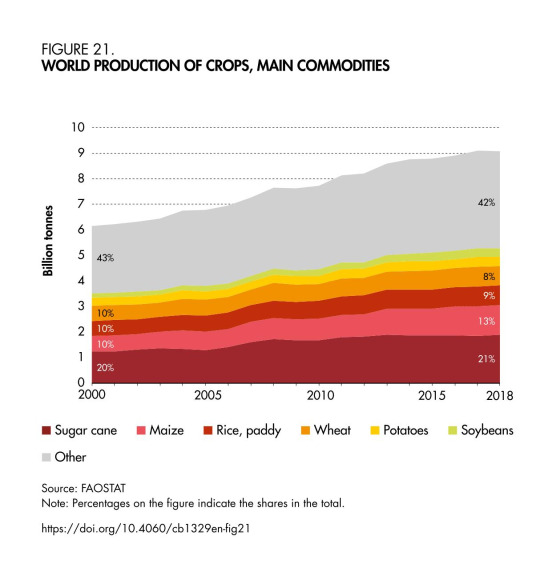
(I didn't want to flood this post with images, but if you google global meat production and you'll see that that's also increasing)
A common rebuttable to this idea is the implementation of population control. I'd be inclined to agree with those that suggest this solution if we'd actually ever done that. We haven't. But I mean, why would we? Governments make more money when they're paid to feed starving nations.
Interlude
If anyone here has read Daniel Quinn's book, Ishmael, you may recognize some of the ideas I've been sharing as some of Quinn's concepts. I wanted to quickly share another one of those concepts, his idea of Natural Law. Summarized, the laws go as follow:
A species should never (or rarely) eliminate their competitors.
A species must not systematically destroy the food source of competitors in order to make room for its own food.
A species must not deny your competitors access to food, unless it needs that food for survival.
A species should not store its food in mass.
Mini note: Keep in mind that Quinn is not suggesting this to be the true "natural law," as such a law is simply unspoken and acted upon naturally throughout time. These "laws" are merely observations that can be made when taking a glance at successful (and unsuccessful) ecosystems. Often, when a species does go extinct, it's because one of these laws was broken. Humans are not the only species to break these laws, in fact I'd argue that an ecosystem's (occasional) breaking of these laws is natural within itself.
Humans are actively doing all four of these things. Agriculture checks off all the laws with flying colors. We are systematically destroying the food source of our competitors (all other species) to make room for our own (farm land). We are denying our competitors access to this food, despite the fact that we do NOT need it for our species survival. We are storing, AND WASTING our food in mass.
(If anyone finds this topic interesting I def suggest the book! It's a tough read, but an eye opener.)
What kind of future are we leaving future generations?
For the immediate future generations (e.g., our children & grandchildren), we are leaving them with harder living, less resources, and a slowly collapsing world. As for the generations to come after that, we are leaving nothing. For the long term I can only hope some populations of humans either return to or continue to live in tune with nature.
Post Note
I do not think there is any realistic way to stop the damage we are doing. I do not have hope that humans will make the changes necessary to avoid this. I'm at peace with this reality to the best extent that I can be. For me, at some point I had to stop trying to advocate so hard and focus on myself.
I know this POV is very nihilistic, so forgive me if it was too grim. I'm not telling you to completely give up hope. Despite how it may seem, I do still have some.
I have hope that some small, local communities and regions will be able to push through these tough times. As I said, I focus less on global activism now and more on a local level. While I can't change the minds of billions, I can do what I can to help prepare my region for a slowly de-globalizing world.
— Mothpear
(I ended up omitting some sections because they weren’t really relevant w/o the rest of the discussion questions so if it ends abruptly, that’s why.)
#essay#ecology#environment#rewilding#climate crisis#long post#environmental essay#climate activism#nature#rewild#climate change#global warming#climate#science#horticulture#ecological#farming#restorative agriculture#permaculture#climate justice#agriculture#conservation#climate strike#regreening#plants#environmentalism#ishmael#extinction rebellion#paper#article
7 notes
·
View notes
Text
This is your reminder to PLANT NATIVE!
4 notes
·
View notes
Text
in my soil sci class having a spiritual experience
#learning ab the earth and all the work shes done...#im emotional#soil science#soil sci#stemblr#horticulture science#ecology
24 notes
·
View notes
Text
Post 1: The Vision
Hello everybody!
My reason for starting this blog is to have a channel for sharing all my tips and experience in propagating various Sonoran native plants, from common ones like Jojoba and Creosote, all the way to things like our Peniocereus greggii subspecies, San Felipe Dogweed, and Elephant Tree (Bursera microphylla)!
There are a lot of things I still don't have good methods of tackling, but I know a lot about really difficult or unrecorded germination proscesses for some really underrated natives, and just like I want to find more information on them, I want to share information too, and contribute to a more wild and natural AZ through education and tips.
Out here, plants range in difficulty germinating, from Rush Milkweed (really easy) to Sugar Sumac (unbearably difficult), and these things depend also on what resources one has on hand. Thankfully, I keep things cheap and simple, so nothing I use is anything too fancy or impractical.
Anyways, I'll have to uploaad pics to my computer for posts, but until then, I wanted to at least make a first post laying out my visions for this self project. I hope that it can reach many people, and enchant even those who don't typically pay heed to our stellar desert adapted flora.
Why tumblr? I don't know where and how else to create a free blog. I'm sure there are simple other ways, but I spend too much time outside and in a greenhouse to know much about how the internet works.
I'll upload soon, once a week at least, with a new plant every time! It'll be fun, so follow and get ready to take notes!
-Arizona Eco-Creature
#sonoran desert#desert#arizona#southwest#native gardening#native plants#botany#horticulture#germination#plant propagation#native wildlife#flora#end plant blindness#ecology#ecowarrior#sustainability#environment#wildlife#bees#pollinators#bugs#wildflowers
0 notes
Text
weird place to be in for me rn- when i reblog posts about hating work i am now only reblogging in solidarity but not because i also hate my job. i actually love my job and wish dearly for everyone to have a chill cool as job like i do now. yesterday on the drive back from the work site, i was just looking out the window at trees n shit and i heard a lighter and when i looked over my boss had lit up a blunt and offered me some
#who knew landscaping was gonna be my thing#im a plant biologist but i keep getting horticulture jobs#but its nice bc my company focuses on ecologically centered landscaping approaches#and this year we went officially 100% organic#no pesticides or herbicides#planting all native species and removing sod lawns to replace it with native species of all kinds#and everyone that works there is great because i dont have to like. mask so hard in front of them#everyones allowed to be as weird as they want bc my boss is kind of a freak (in a good way)
1 note
·
View note